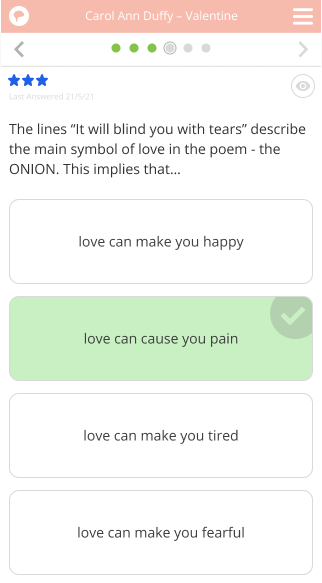World Poetry Day 2023 - Poetry education in the UK
by Georgia, Content Writer – Tassomai
“Practiced throughout history – in every culture and on every continent – poetry speaks to our common humanity and our shared values, transforming the simplest of poems into a powerful catalyst for dialogue and peace.”
World Poetry Day offers us a great opportunity to reflect on the challenges and benefits of poetry education in the UK. With exam poetry clusters offering poems from the Romantic era straight through to the present day, interpreting poetry can often be an intimidating task for a student. Our Tassomai poetry content helps to make engaging with poetry more accessible, and we hope that this inspires our students to explore how poetry can be a tool to enrich their lives. The National Literacy Trust reported in 2020 that 66.5% of young people found that writing poetry helped them to feel better during lockdown, which is just one of the ways in which students can benefit from studying poetry.
Understanding Terminology
Although older, more traditional poetry can appear difficult to engage with when first reading it, an understanding of form can help students to get the most out of interpreting and finding a ‘meaning’ within a poem. Tassomai’s Unseen Poetry course offers a wide range of questions that explain formal and structural elements to help students with this. One area this course covers is the sonnet form, such as this question that asks about the form of William Shakespeare’s Sonnet 18
Diversifying The Curriculum
Whilst exam boards are making changes to bring greater diversity in prose and plays to the curriculum, The Runnymede Trust and Penguin Random House Lit in Colour Report published in 2020 concluded that poetry still remains the most common place for students to engage with a text by an author of colour. Many poets on the curriculum write openly about the theme of identity, which can prove a vital resource for many students who hope to see their background represented in what they are studying.
For example, John Agard’s brilliant Checking Out Me History explores the speaker’s identity through mixing ‘standard’ English with the Caribbean Creole:
Poetry On The Rise
The National Literacy Trust reported in 2022 that the number of young people that said they read poetry at least once a month had increased by a third from 2010. Whether that is from better poetry representation in schools or from the increased popularity of poets on social media, it is fantastic to see more students becoming passionate about poetry - a form that can help students to increase their literacy levels and creative output. Whilst perhaps the most exciting part of poetry is its endless possibility for interpretation, this is something that can be hard to teach. Some of Tassomai’s poetry questions encourage to help students reach their own understanding of a poem’s message, such as this one that covers Carol Ann Duffy’s Valentine:
Tassomai’s KS4 English literature course covers the poetry clusters for AQA, EDX and OCR. Tassomai also helps students prepare for the unseen poetry element of their GCSE English exams by testing students on their knowledge of a range of poetic and literary techniques, giving them a framework for analysis.
Find out more about Tassomai’s English literature offering for schools or read about English literature courses for private subscribing families.



